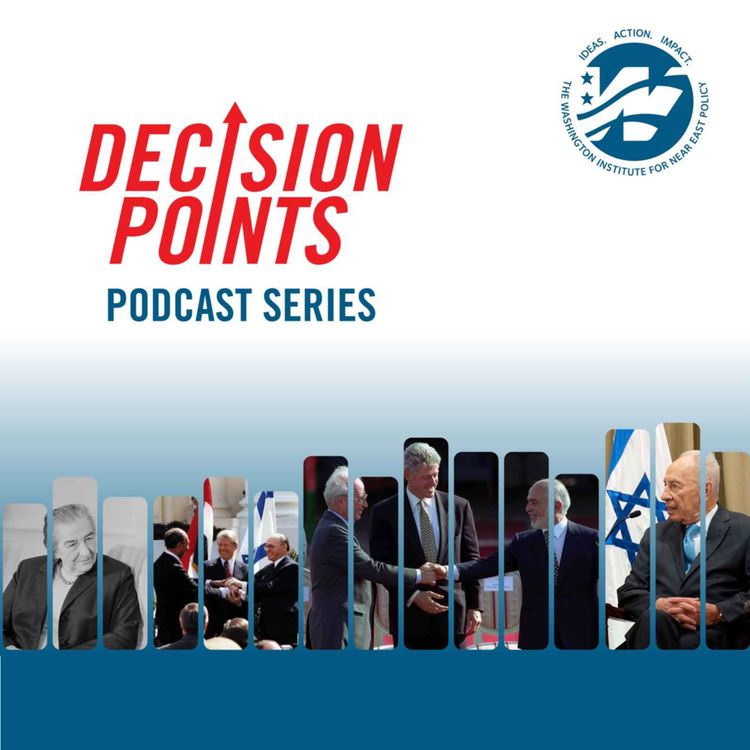Share

Decision Points
Ariel Sharon’s Road from Settlement Building to Gaza Withdrawal
Israel’s Ariel Sharon gained early renown for his battlefield courage and notoriety for his strident opposition to Palestinian statehood. But Sharon, who served as prime minister from 2001 to 2006, was not an ideologue. When he saw pragmatic opportunities to advance Israel’s long-term interests, he pursued them, explaining his leading role in the 2005 Gaza disengagement plan. The program entailed the evacuation of some eight thousand Jewish residents in twenty-one settlements in Gaza, in addition to four settlements in the West Bank, causing much dismay among the prime minister’s former acolytes. Yet Sharon made what he considered the right choice, thereby improbably advancing Palestinian claims to statehood. Gaza disengagement would mark an endpoint in Ariel Sharon’s political evolution and endure as one of his most significant legacies.
In this episode of Decision Points, David Makovsky discusses Sharon with two figures intimately engaged in the Gaza disengagement: Stephen Hadley, who served as President George W. Bush’s national security advisor, and Dubi Weissglas, Sharon’s closest policy advisor when he was prime minister and an architect of disengagement.
Clips Used
Israeli cabinet approves Gaza withdrawal 14-7
More episodes
View all episodes

Israel into 2025: Building on Regional Successes, Avoiding Domestic Fractures
46:14|Israeli society has been through the gambit of emotions in 2024: from the national trauma of the aftermath of October 7th and repeated failed hostage negotiations, to major military achievements that have shifted the regional security landscape. As the nation looks ahead to 2025, healing internal divisions within Israel remains elusive despite the major moves to restore regional deterrence during the second half of 2024.Profound internal divisions abound. Much of the Israeli public sees the government as maneuvering to avoid a national Commission of Inquiry to investigate the failures of October 7th. At the same time, the looming prospect of permanent exemption of the ultra-orthodox from the military draft is widely unpopular, and the government’s approach to hostage negotiations has sparked widespread dissent and mass protests. Taken together, it seems that if this government fails, it will not be due to external threats, but rather because of internal divisions on these key domestic issues. How will tensions between the Trump administration’s desire to end the war and the Israeli right’s push to remain in Gaza indefinitely play out? How much the public react to a partial hostage deal that may be close at hand? How are domestic political controversies influencing Israel’s geopolitical strategy and do they impact the durability of the current coalition? And what role – if any – does Netanyahu’s ongoing trial play in this critical moment?In this episode of Decision Points, David Makovsky is joined by Yossi Klein Halevi. Yossi is a veteran keen observer of Israeli society and is a Senior Fellow at the Shalom Hartman Institute in Jerusalem. He is the author of several acclaimed books on the conflict, including the New York Times bestseller Letters to My Palestinian Neighbor, and co-host of the Institute’s podcast, For Heaven’s Sake. Together, they discuss the challenges of restoring regional deterrence while striving for internal cohesion as Israel enters 2025.
After Assad: Navigating Syria's Power Vacuum and Regional Fallout
01:03:43|After just a few days of fighting, Bashar al-Assad's regime has fallen, and Assad has fled to Russia. However, the collapse of the Assad regime is far from a fairytale ending. The rebels responsible for toppling Assad, Hayat Tahrir al-Sham (HTS), are designated as a terrorist organization by the United States, and history shows that power vacuums in the Middle East often lead to prolonged instability and conflict.HTS currently holds a dominant position, but Syria’s balance of power remains precarious. Competing factions are poised to challenge HTS, creating a volatile security landscape. Meanwhile, the fall of the Assad regime has significant implications for Israel. Syria has been a critical component of Iran’s axis, serving as a conduit for weapons and illicit materials to reach the West Bank and Jordan.At this critical juncture, the future of Syria hangs in the balance. How much influence will Russia, Turkey, and Iran exert in shaping Syria’s trajectory? Who will ultimately fill the power vacuum? And what role will the U.S. and Israel play in this tense and rapidly evolving environment?In this episode of Decision Points, David Makovsky is joined by Andrew Tabler and Tamir Hayman. Andrew Tabler, a senior fellow at the Washington Institute, previously served as Senior Advisor to the Special Envoy for Syria Engagement at the State Department and as Director for Syria Affairs at the White House National Security Council. Tamir Hayman, the current Director of INSS—Israel’s leading national security think tank—served as Head of IDF Intelligence, focusing on Iranian entrenchment in Syria, and previously led efforts to provide humanitarian assistance in southern Syria.
17. Inside the Middle East: How War, Ceasefires, and Trump’s Arrival Are Reshaping the Middle East
52:04||Season 5, Ep. 17The past few weeks in the region have been some of the most eventful in recent history. Hizbullah, the crown jewel of Iran’s proxy network, has suffered a devastating blow, Iran’s air defense systems have been dismantled, and a fragile ceasefire between Israel and Lebanon has been established. At the same time, the election of President Trump has introduced an entirely new level of unpredictability, sending shockwaves throughout the region.How is the war reshaping perceptions within the Middle East, particularly regarding the Israel-Lebanon ceasefire? How does the concept of Iran’s “ring of fire” hold up in this new reality? What does Saudi Arabia’s approach to normalization with Israel mean for its leadership and the future of Gaza? And how are these shifting dynamics influenced by the Trump administration?On this episode of Decision Points, David Makovsky is joined by Bernard Haykel, a leading authority on Middle Eastern politics, religion, and society, and someone who has spent more time with Saudi Crown Prince Muhammad bin Salman (MBS) than perhaps any American over the last decade. Bernard will soon be releasing his book on MBS, and as a scholar with a personal connection to the region—having grown up during Lebanon’s civil war—he brings a unique insider perspective on the Middle East’s complexities.
16. Will the Israel-Lebanon Ceasefire Hold?
40:13||Season 5, Ep. 16After more than a year of intense fighting between Israel and Hezbollah, President Biden recently announced a ceasefire, raising hopes that this agreement could save lives, restore stability, and bring an end to the unprecedented escalation that began with the October 7 attacks. But how did this ceasefire come about, and how does it compare to the conclusion of the 2006 war in Lebanon?Israeli Prime Minister Benjamin Netanyahu has claimed that Hezbollah has been set back by decades due to the Israeli military’s strikes. Is this an accurate assessment? What role have external players—like the U.S. and Iran—played in shaping this outcome, and could this moment signal a shift in Iran’s regional calculus?Perhaps most importantly, does this ceasefire mark a new phase in Israel’s broader security strategy in the region? To help unpack these critical questions, David Makovsky is joined by Amos Harel, one of Israel’s leading military analysts and a senior correspondent for Haaretz. Amos has extensively covered Israel’s northern front and is a keen observer of the country’s military strategies and security leadership.
15. Israel and Iran Tensions: Calculating Risk Amid Conflict
52:36||Season 5, Ep. 15Since October 1st, tensions between Israel and Iran have reached new heights. In recent weeks, we’ve seen significant Israeli strikes on Iranian targets and a weakening of Iran’s proxy network. At the same time, Israel is stretched across multiple active fronts, challenging its traditional military doctrine of short, decisive wars and increasing its reliance on U.S. resupply. With Iran reeling from the damage and Israel adopting a bold defensive posture, the coming weeks are set to be critical.As the balance of power shifts, the risk of a broader conflict grows. How might Israel respond to direct Iranian retaliation, and what could this mean for its approach to Iran’s nuclear infrastructure? Could the conflict evolve into a war of attrition, or will Israel use its momentum to push for decisive action? To explore these questions, David Makovsky is joined by two experts: Karim Sadjadpour, a senior fellow at the Carnegie Endowment for International Peace specializing in Iran and U.S. policy in the Middle East, and Assaf Orion, the Liz and Mony Rueven International Fellow at The Washington Institute and a retired Israeli brigadier general and defense strategist.
14. Post-Sinwar: Hostages, Succession & Thwarting Hamas Revival
58:56||Season 5, Ep. 14On October 16th, the world was shocked to learn that the architect of the October 7th attacks, Yahya Sinwar, was killed by an IDF infantry unit. Yahya Sinwar’s death was a central goal of the Israeli war effort, and it marks a significant turning point for Hamas leadership, hostage negotiations, and Palestinian society. In this episode, David Makovsky is joined by two experts, Ghaith Al-Omari and Dr. Michael Milshtein. Ghaith Al-Omari is a senior fellow at The Washington Institute, former executive director of the American Task Force on Palestine, and former advisor to the Palestinian negotiating team. Dr. Michael Milshtein is the Head of the Palestinian Studies Forum at Tel Aviv University, and he formerly was the Advisor on Palestinian Affairs in COGAT and the Head of the Department for Palestinians Affairs in IDF Military Intelligence. Together, they will explore the implications of this high-profile death on Hamas's internal politics, potential shifts in regional power dynamics, and what it could mean for Israel’s next steps in the conflict.
13. Trump & Harris Senior Advisors Contrast Visions for US Middle East Policy
01:11:57||Season 5, Ep. 13On November 5th, Americans will head to the polls to make a decision that will shape U.S. foreign policy towards the Middle East for years to come. Now more than ever, it is important to understand the critical foreign policy decisions that lie ahead for the United States. With the Middle East at a pivotal juncture, the outcome of this election will have lasting implications for U.S.-Israel relations, regional diplomacy, and the day after in Gaza.In this episode, David Makovsky is joined by two distinguished experts: Tom Nides and Victoria Coates. Tom Nides served as U.S. Ambassador to Israel during the Biden administration. Victoria Coates is the former Deputy National Security Advisor for the Middle East and North Africa under President Trump. Together, they provide a comprehensive look at each candidate's position on these important issues. Join us for an extremely timely discussion on how the next U.S. administration could shape the region's future.
12. Hezbollah Decapitated?: The War with Israel and Lebanon's Future
52:33||Season 5, Ep. 12The past few weeks have been some of the most pivotal in Israel’s modern history with Lebanon. Recently, Israeli intelligence and operational successes have delivered devastating blows to Hezbollah’s leadership, decapitating its senior command, including the infamous Hassan Nasrallah. With thousands displaced across Northern Israel and Lebanon due to the conflict, tensions have never been higher.In this episode, David Makovsky is joined by two leading experts: Hanin Ghaddar and Matt Levitt. Hanin, a senior fellow at the Washington Institute, has written extensively on Hezbollah's role in Lebanon's political system and Iran's growing influence in the region. Matt Levitt is the director of the counterterrorism and intelligence program at the Washington Institute. He has held key roles in the U.S. government, including deputy assistant secretary for intelligence and analysis at the U.S. Department of the Treasury. He recently published a new version of his book Hezbollah: The Global Footprint of Lebanon's Party of God. Together, they will explore the internal dynamics within Lebanon amidst this crisis, what this moment means for the future of Hezbollah, and the strategic and operational factors that underpin these developments.
11. Iran, Israel & Missiles: Roots of Iran's Enmity & Military Escalation
55:38||Season 5, Ep. 11Iran's recent ballistic missile attack on Israel marks a significant escalation in their long-standing enmity. This attack, one of the largest in history, raises critical questions about the future of the relationship and the region at large. As tensions peak, the strategic, political, and ideological dimensions of this rivalry take on even greater importance, with both Israel’s defensive responses and Iran's aggressive stance setting the stage for potential further clashes. In this episode of Decision Points, David Makovsky is joined by two leading experts: Ray Takeyh and Meir Litvak. Ray Takeyh is a senior fellow for Middle East studies at the Council on Foreign Relations, specializing in Iran, U.S. foreign policy, and the modern Middle East. Meir Litvak, professor at Tel Aviv University and director of the Alliance Center for Iranian Studies, brings decades of expertise in the intersection of religion, society, and politics in Iran, with a focus on Shi’a Islam and Iranian nationalism. Together, they delve into the roots of Iran's ideological hostility towards Israel, the internal dynamics of the Iranian regime, and how the regime’s anti-Zionism has shaped its foreign policy.